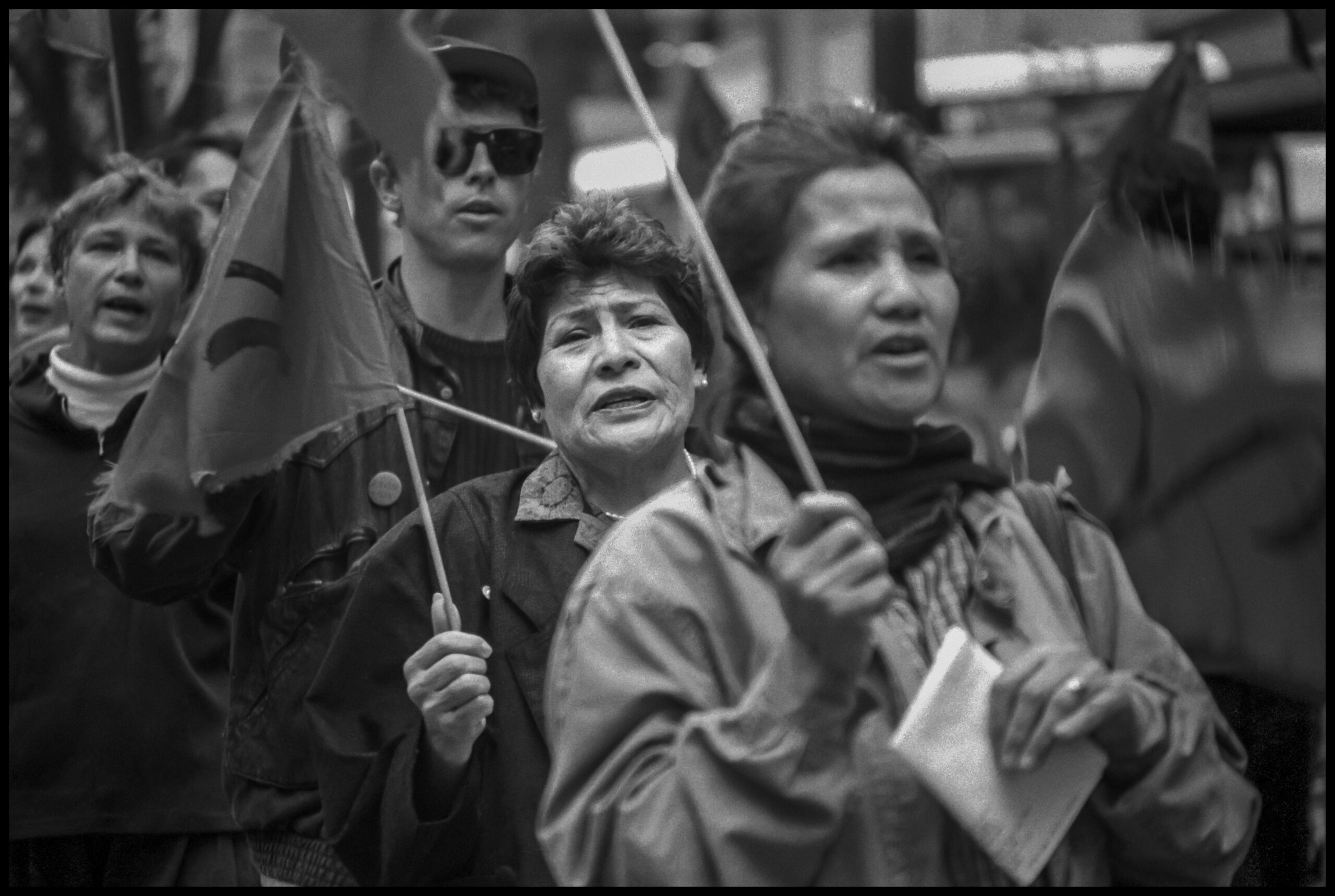

Who Killed Overtime Pay?
You Probably Aren’t Getting Paid Overtime. Here’s Why.
How employers get away with denying workers income they used to earn.
After decades of decline in overtime pay, the Biden administration is considering action to sharply expand access in a time of high inflation. This is the third article of a four-part series examining the 40-year effort by big business and elected officials to deny Americans extra pay for extra work.
Guests at the Tempe Mission Palms resort hotel — with its mid-century lounge and heated rooftop pool — are unlikely to think much about workers like Yolanda Hernandez. After all, she is usually in the laundry room cleaning the soiled sheets and dirty towels they leave behind.
Hernandez’s workday typically begins at 7 a.m. and, since she’s often required to work extra hours, she sometimes stays on the job into the evening. Even though guests frequently fork over $300 a night for a room, Hernandez says her employers don’t always pay her the small supplemental overtime she legally earns. Despite three decades doing this sort of work in the Arizona desert, she has often received her paycheck at her current job and discovered “they’d short me on hours.”
The problem is that Hernandez, who turns 60 this year, depends on that overtime pay to help buy groceries, pay the rent and build a little financial security. The loss of five or six hours of overtime pay is both disheartening and detrimental. “I’d be planning for an extra bump in my check and, when it wouldn’t be there, it would be a blow and I would have to scramble to make ends meet.”
Representatives for the hotel and the parent company, Hyatt, did not respond to repeated requests for comment.
Millions of workers in the United States lose overtime pay when employers do things like manipulate the accounting of their work hours. It is difficult to nail down the precise losses to workers from such employer tactics, but a 2017 Economic Policy Institute study of the nation’s 10 most populous states calculated that employees living in them lose more than $8 billion a year due to wage theft.
“Extrapolating these numbers across all 50 states, the total wages stolen from workers each year exceeds $15 billion in the United States,” noted Anthony Damelio’s November article in the Fordham Urban Law Journal. That rivals the $16.4 billion value of all property crime nationwide in 2018.
But in 2019, the Labor Department cited just 8,500 employers for taking approximately $287 million from workers, according to a Center for Public Integrity analysis.

Seeking recognition of their union, hotel staff picketed San Francisco’s Parc 55 hotel in 1989, accusing their employers of forcing them to work off the clock, preventing some workers from receiving overtime pay. All photos by David Bacon.
Among the alleged victims of wage theft, Hernandez is somewhat unique. She is aware of her rights, unlike many workers who don’t know if they qualify for overtime or what to do when employers fudge their hours to avoid paying it. Without such knowledge, low-wage workers — especially undocumented ones — are in little position to act on laws designed to protect workers’ rights and hold employers accountable.
Linda Luna Lara, an employment lawyer based in Irvine, California, notes that many workers earning less than $35,000 per year and working at least 50 hours per week are not receiving time and a half pay for the overtime hours.
A long roster of Lara’s clients have or had employers who, she alleges, have intentionally misclassified them so they fall under a managerial exemption. The law says that if a worker manages two or more employees for at least half of their time on the job, they are not eligible for overtime.
Many businesses take advantage of the exemption to save money, Lara says, adding, “Unless they’re called out for it, they don’t care.”
For decades, the wind has been at many employers’ backs as the number of salaried workers who qualify for overtime has shriveled, from 60% in 1975 to a nadir of 7% in 2016, before increasing slightly.
Greatly diminished pay is no accident; it was the result of hard work by lawmakers, and policymakers in Republican administrations and excessive caution under Democrats.
“How have we let these labor standards erode so dramatically?” asks Heidi Shierholz, the president of the Economic Policy Institute. “There is zero doubt that ramped-up corporate lobbying is a big part of the answer.”

A housekeeper prepares a room at a San Francisco hotel in 2007. In nonunion hotels, workers put in hours loading their carts and performing other tasks, and are sometimes not paid for their time on such duties.
Stealing Time?
Wage theft has a long history in the United States. It was so prevalent in the early 20th century that it helped to prompt passage of the New Deal’s Fair Labor Standards Act, which laid the foundations of modern labor law, including the minimum wage and mandatory overtime pay.
Days after the act’s passage in June 1938, the business lobby mounted fierce opposition even as newspapers revealed numerous wage-theft efforts. Soon after, workers at a General Mills plant in Larrowe, Ohio, complained when their superintendent told them they should continue to work 56-hour weeks, but their regular pay for the first 40 hours a week would be recalibrated downward so that they ended up with the same weekly wage, according to the book Moments Are the Elements of Profit, by labor researcher Marc Linder.
In other examples at the time, one employer wrote to seek the Labor Department’s blessing for a “costless compliance” scheme to lower wages for their employees’ first 44 hours each week. A steel foundry in Ohio made plans to sharply reduce its hourly wage by 40% — from 70 cents an hour to 40 cents an hour — to reduce its payroll costs. Another employer sought to get around the law by simply stamping a “waiver” of overtime payments on paychecks, as though workers cashing the checks constituted a tacit agreement to forgo overtime.
Fast-forward to the present, when modern employers use an array of techniques:
-
- Manipulating the clock. One of the more common examples of wage theft, especially in blue-collar jobs like construction, involves manipulation of the clock-in and clock-out process. “They won’t let an employee clock in until they reach that job site, which might be a one- or two-hour commute from the main construction company office,” says Lara’s law partner and husband, Ed Lara. He notes that such workers must sometimes start their days by purchasing materials and supplies, but they don’t get paid for their time until they arrive at a work site after shopping at stores like Home Depot and Lowe’s. Ed adds that delivery drivers who have to go to warehouses to get packages ready are often required to do such work before clocking in.
- Averaging. Employers sometimes deprive workers of overtime wages by averaging their hours out from different weeks — so if an employee works 30 hours one week and 50 hours the next week, it’s averaged to 40 hours a week and they receive no overtime.
- Underpaying. This technique, which Hernandez claims she experienced on the job, involves simply paying less than time and a half to workers who put in extra hours by taking unauthorized deductions from a worker’s pay or by failing to remunerate them for all of the hours they work.

After then-Gov. Pete Wilson pushed to abolish overtime pay in 1997 for days of work longer than eight hours, people protested in front of the office of California’s Industrial Welfare Commission in San Francisco. The state body ultimately voted to go along with the governor.
The Decline of Small-Business Overtime
One key reason for the precipitous drop in the number of workers who receive overtime is that many were excluded from it by a change made during the presidency of George Herbert Walker Bush when small businesses — those reporting less than $500,000 in revenue — became exempt from most wage and hour laws. That shift cut off overtime eligibility for tens of millions of workers at small companies.
Since employees at such businesses cannot access overtime at all, and employers often benefit from weak or nonexistent labor rule enforcement in general, particularly in rural states, former Labor Department investigator Michael McGrorty says, “The worst place in America to work is for a small business.”
Another big reason for the decline in overtime, say employee advocates and some economists, is that employers engaging in unlawful practices have little incentive to end them.
The largest fine for the repeated or “willful” violation of minimum wage or overtime laws by a business is just $2,203 per incident. And even when inspectors find wrongdoing, they only assess monetary penalties in roughly half of cases, per Labor Department reports.
Some other countries treat such actions harshly. Australia’s penalty for these sorts of workplace violations is $630,000 per incident for companies and $126,000 for serious breaches of the law by individual business owners.
Also, under the Fair Labor Standards Act, employees in the United States can only recover two years of back wages — no matter how many years or decades they have been underpaid — and three years if the violations are deemed willful.
Moreover, former Department of Labor investigator McGrorty says federal and state investigators are often loath to pursue anything but the most egregious violations. “They tend to back off unless there’s a situation of absolute non-payment.” When faced with the possibility that the statute of limitations will expire, investigators often give up, he explains.
Laws With Little Enforcement
Enforcement of overtime violations by the Department of Labor has been uneven at best. “You can have the strongest overtime protections in the world — but those laws don’t mean anything if they’re not enforced,” says McGrorty.
Federal and state agencies are woefully understaffed and under-resourced when it comes to keeping an eye on millions of workplaces that employ many millions of workers who should qualify for overtime. The Department of Labor has seen its roster of Wage and Hour Division investigators decline from 1,600 inspectors in 1980 to just 725 inspectors in early 2022, a 50-year low — even as the size of the workforce has increased sharply during that time.
“A lot of the investigators that I knew in the agency felt like that they were just barely treading water,” a former administrator told Bloomberg Law. “They really weren’t in a position to effectively do their job, because they were so understaffed.”
The Department of Labor did not respond to requests for comment.
As for states, they have a patchwork of enforcement mechanisms, with some like California and New York having fairly well-funded agencies, and others in the South lacking any agency focused on enforcing wage and hour laws.
Companies that seek to cut corners are less likely to comply with labor laws — unless there is strong enforcement or there are stiff penalties, according to an analysis by Anna Stansbury in a 2021 Peterson Institute for International Economics report. In her research, she found just six criminal convictions for violations of overtime laws between 2005 and 2016, even though the Labor Department identified nearly 3,000 willful violations during that time period.
This system of enforcement has become less efficient over the decades due to sharp reductions in funding and the increasing complexity of a workforce that includes more gig workers and independent contractors.
The agency has been blamed for mishandling how it enforces one of the most common types of wage and hour violations — those in which employers assign job titles to workers that nullify the possibility of overtime.
In California alone in 2019, the state found that 93% of employers that it audited had misclassified workers the previous year.
Even in cases that involve substantial overtime violations, companies sometimes aren’t required to pay anything. In 2010, an Obama-era Labor Department investigator determined that Arise Virtual Solutions, a California company, owed 20,000 customer service agents $14.2 million in back wages due to minimum-wage and overtime violations, but the company paid nothing. Why? The employees were considered independent contractors.
The Labor Department holds community outreach events — and has doubled their frequency in recent years. It also sends out posters to employers to inform workers of their rights and their overtime and minimum wage eligibility, but many workplaces, especially in low-wage industries, don’t post those notices in places where employees will see them.
And even if the often-complicated rules are posted at a workplace where the law is being violated, a worker’s understanding may be more shaped by norms, even in the face of more accurate information displayed in front of them.

Betty Johnson was a daycare worker in the town of Cotati in Sonoma County in 2004. At the time, such employees had no legal overtime rights in California.
When Businesses Do More With Less
COVID-19 has put the hotel industry through particular turmoil. During the pandemic, Hernandez says her employer laid off many of her colleagues and, in many cases, hasn’t hired them back even as the workload has ramped back up faster than expected. “They’re trying to do more with less,” she says.
That can lead to 10-hour shifts, from 7 a.m. until 5 p.m. or later, and to working full shifts six days a week. When staff say they can’t work the extra hours, she says, the manager makes clear that the extra hours are mandatory. “Workers are getting pissed because they’re not getting a choice on overtime,” says Hernandez.
At other times, as a result of the guesswork involved in staffing such a hotel in turbulent times, she says employees show up for shifts only to be sent home early, depriving them of overtime pay they expected.
To cut back on these sorts of abusive practices, advocates for low-income workers are urging the Biden administration to push through a promised overhaul of rules to expand overtime eligibility and bolster enforcement.
In the meantime, many workers are unclear on when their rights are being violated. “So many of my coworkers don’t know their rights and they’re losing out on money they need to feed their families,” says Hernandez. “They’ve never been told that they deserve the money, so they don’t ask.”
Copyright 2022 Capital & Main.
All photos copyright David Bacon.
This is the third in a series of four articles about overtime, produced by Capital & Main in partnership with the McGraw Center for Business Journalism at CUNY’s Newmark Graduate School of Journalism and Type Investigations, with support from the Puffin Foundation.

-

 Latest NewsFebruary 3, 2026
Latest NewsFebruary 3, 2026Amid the Violent Minnesota Raids, ICE Arrests Over 100 Refugees, Ships Many to Texas
-

 Featured VideoFebruary 4, 2026
Featured VideoFebruary 4, 2026Protesters Turn to Economic Disruption to Fight ICE
-

 The SlickFebruary 2, 2026
The SlickFebruary 2, 2026Colorado May Ask Big Oil to Leave Millions of Dollars in the Ground
-

 Column - State of InequalityFebruary 5, 2026
Column - State of InequalityFebruary 5, 2026Lawsuits Push Back on Trump’s Attack on Child Care
-

 Column - California UncoveredFebruary 6, 2026
Column - California UncoveredFebruary 6, 2026What It’s Like On the Front Line as Health Care Cuts Start to Hit
-

 The SlickFebruary 10, 2026
The SlickFebruary 10, 2026New Mexico Again Debates Greenhouse Gas Reductions as Snow Melts
-

 Latest NewsFebruary 12, 2026
Latest NewsFebruary 12, 2026Trump Administration ‘Wanted to Use Us as a Trophy,’ Says School Board Member Arrested Over Church Protest
-

 Latest NewsFebruary 10, 2026
Latest NewsFebruary 10, 2026Louisiana Bets Big on ‘Blue Ammonia.’ Communities Along Cancer Alley Brace for the Cost.
